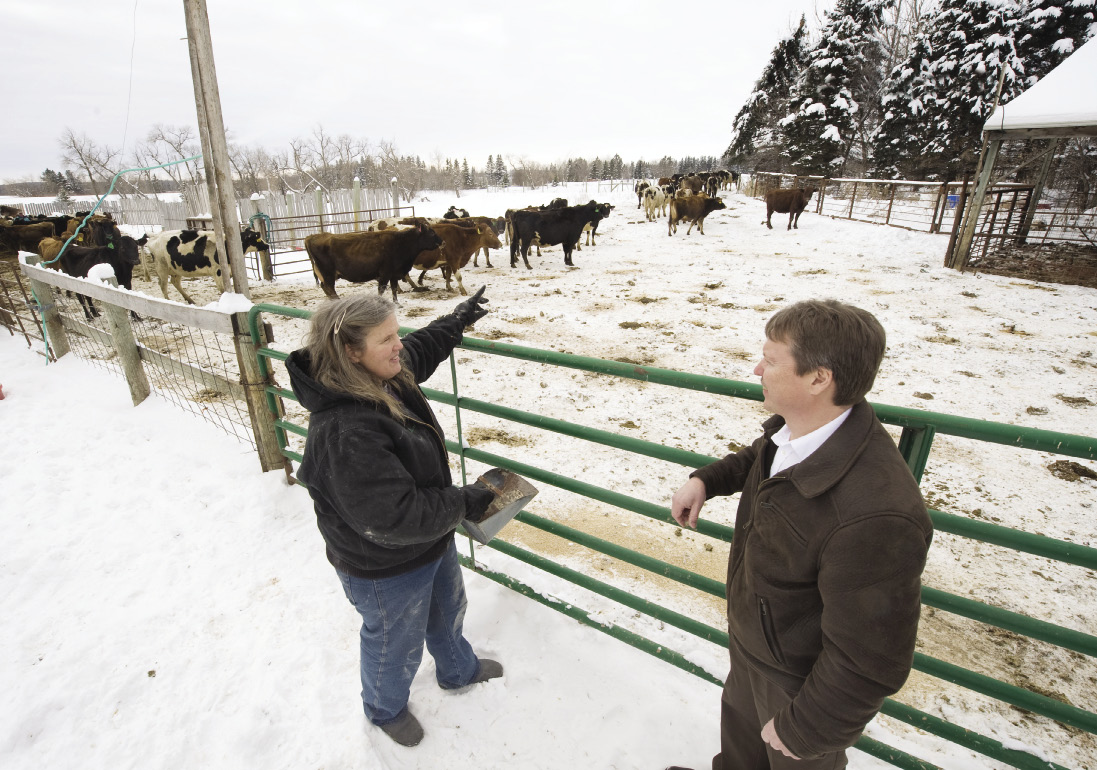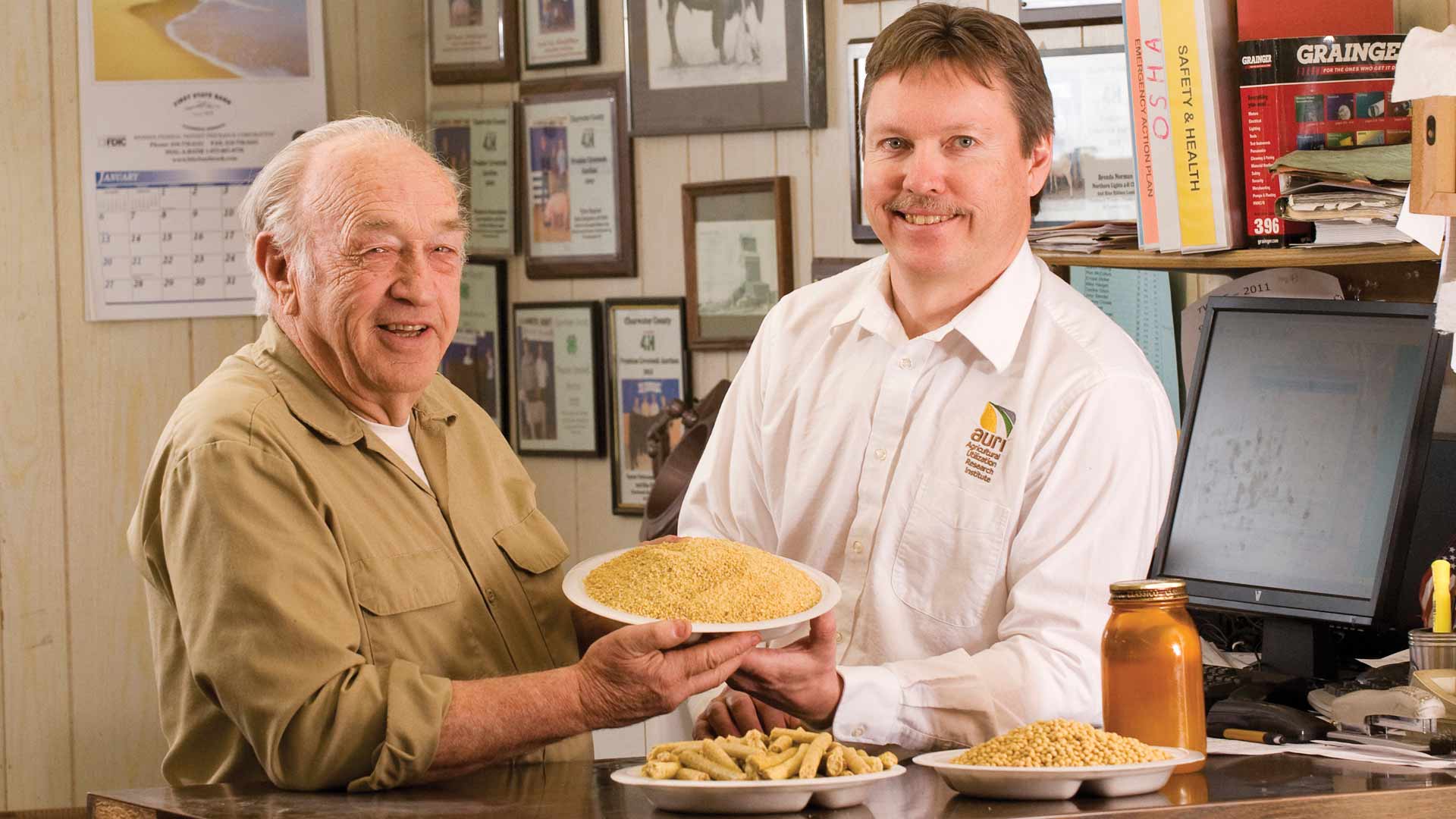–by Liz Morrison
photos by Rolf Hagberg
Times are tough for small country elevators. Big grain price swings, higher capital requirements and consolidation have eroded profits, forcing many rural elevators to close.
But a struggling coop elevator in northwest Minnesota met these challenges by responding to a need for organic feed.
With help from AURI, Clearbrook Elevator is crushing organic soybeans for certified organic dairy feed. What began as a sideline business has grown to nearly half of the elevator’s $2 million annual feed revenues. Now, the 200-member coop has set its sights on further expansion of the organic feed business.
“Over the years, it’s been very difficult to stay in business,” says Glen Nelson, manager of the Clearbrook Elevator, which was founded in 1939. The organic soybean crushing operation “has helped us maintain a profitable bottom line. In the last three years, or so, we’re doing much better.”
A need arises
The venture began with a request from a nearby dairy farm. In 2005, Carol and Arne Kleppe, longtime milk producers from Clearbrook, decided to begin the transition to organic. That meant their 130-cow herd could be fed only certified
organic feedstuffs.
At the time, Carol Kleppe (cover photo) was serving her third term on the Clearbrook Elevator Board of Directors. “The elevator was struggling,” she says. “Their largest account had stopped milking the year before, and I was afraid if we quit buying feed, too, it would be another significant financial blow to the elevator.” At a board meeting, she asked if the coop would be interested in supplying organic feed.
Nelson decided to look into it, and asked AURI for help in evaluating the idea.
“We helped them do a preliminary feasibility analysis on small-scale soybean crushing to see if this made sense for them,” says AURI Project Manager Randy Hilliard, who has worked with the coop for several years.
Later, Kleppe recalls, Nelson told the board: I think this is something we could — and should — do.
Developing suppliers and customers
At first, it was a struggle to source enough certified organic soybeans to supply the need for organic meal. “There weren’t that many growers” offering feed-grade organic soybeans, Nelson says. Minnesota farmers typically plant 25,000 to 30,000 acres of organic soybeans, many of them food-grade beans destined for Asia. But word got around about the little elevator in Clearbrook, and now, “I have organic growers calling me.”
The elevator pays hefty premiums for organic — typically at least double the price of conventionally-grown soybeans. In early January, for example, feed-grade organic beans were trading for about $28/bushel. Organic soybean meal also commands about twice the price of conventional meal, running around $1,100 per ton.
Beginning with the Kleppes, who achieved organic certification in 2007, the coop’s organic soybean meal customers have grown to about 15. The soybean oil is also sold as organic livestock feed. 
One of just two commercial certified organic soybean crushing facilities in Minnesota, Clearbrook Elevator now crushes about 300 tons of organic soybeans a year.
The company is continuing to expand its organic soybean meal business, aided by a $300,000 USDA Value-Added Producer Grant awarded last February. In order to help Clearbrook apply for the grant, Hilliard connected the elevator with Cooperative Development Services, which put together a formal business and marketing plan necessary for the application, and AURI offered cost-share assistance for the services.
The grant enabled the coop to hire a salesman to call on organic livestock producers, marketing to organic poultry and hog producers in addition to milk producers. The elevator, which employs eight, also added a new staff position to handle the growing organic operation.
Supporting the organic sector
Having a local supply of organic soybean meal has been a boon to northwest Minnesota’s organic livestock sector, says Carol Kleppe. She’s convinced that “if it weren’t for going organic, we wouldn’t be dairying today.”
Organic milk premiums have helped them, and other small milk producers, stay in business, she says. The Kleppes and five other organic dairy farms in Polk and Clearwater counties all sell their milk to Organic Valley, of LaForge, Wis. Together they produce enough milk to make it practical for Organic Valley to send a milk truck.
Clearbrook Elevator is a good example of successful rural economic development, Hilliard says. The soybean venture has helped maintain a longtime business in the town of 500 and has even created a couple of new jobs. It also shows “how AURI can assist with an idea from the beginning, starting with feasibility, all the way through implementation. And AURI continues to be there for them as they expand.”
AURI and Clearbrook Elevator
Idea to reality:
Minnesota’s Clearbrook Elevator received interest from customers who wanted to buy organic feed for their livestock.
AURI’s role:
AURI conducted a preliminary feasibility analysis, offered innovation networking with Cooperative Development Services and helped Clearbrook receive a $300,000 USDA Value-Added Producer Grant.
Outcomes:
One of just two commercial certified organic soybean crushing facilities in Minnesota, Clearbrook Elevator now cruches about 300 tons of organic soybeans a year, and organic feed represents nearly half of the elevator’s $2 million in annual feed revenue.
Partners:
USDA, Cooperative Development Services

